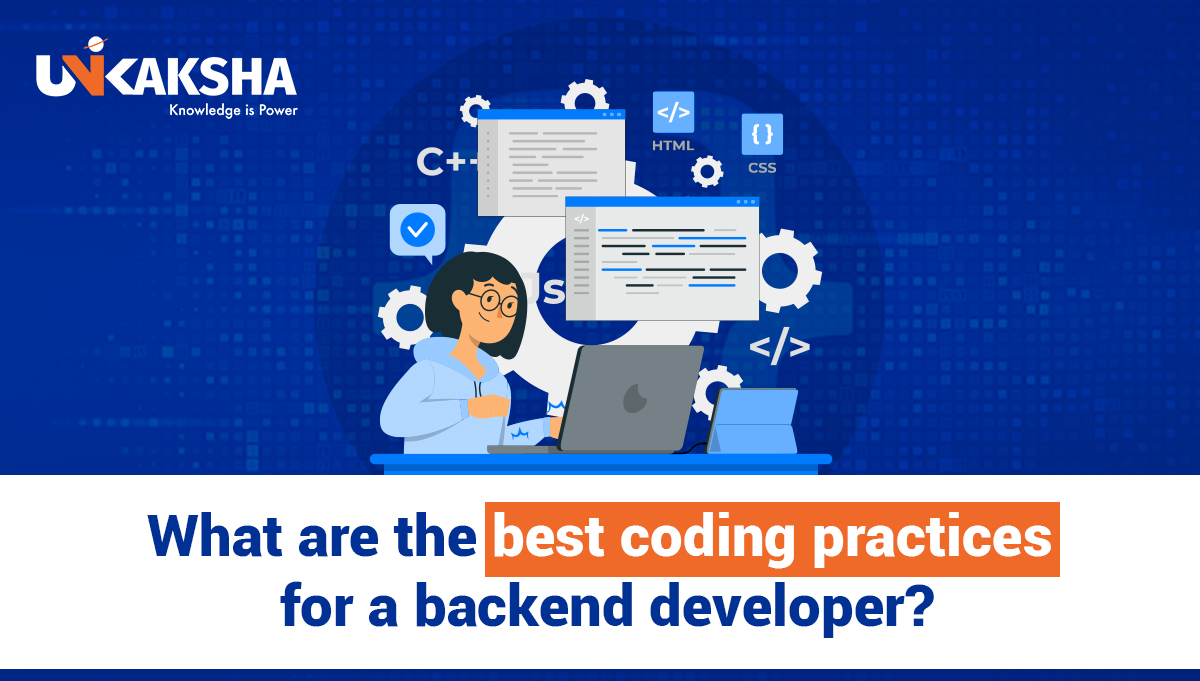What are the best coding practices for a backend developer?

Any developer will tell you that coding is an essential part of their job. But what separates a great coder from just a coder? It’s not just the ability to write code that works. It’s also important to write code that is maintainable, scalable, and readable.
As the world increasingly relies on software to perform critical tasks, the importance of good coding practices for backend developers becomes more evident. Despite this, many developers do not follow best practices, which can lead to problems down the road. By following good coding practices, backend developers can avoid common mistakes, improve the quality of their code, and make their jobs easier in the long run.
What backend coding is and why good practices are important?
Coding is a fundamental skill for any computer scientist, programmer, developer, or engineer. It is the process of transforming human-readable code into machine-readable code. There are many different coding languages, but all share some commonalities. In order to write efficient and reliable code, it is important to follow good coding practices as this will ensure that the site or app is stable and secure.
Some of the most important coding practices for backend developers include using comments and documentation, properly formatting code, using consistent naming conventions, and avoiding hard-coding values.
In this blog, we have put together a list of good coding practices that will be useful for backend developers:
Coding standards:
how to format your code for readability When it comes to coding, first impressions matter. How you format your code can make all the difference in how easily others can read and understand it. By following some simple coding standards, you can improve the readability of your code and perfect your core coding skills.
There are a few basic things to keep in mind when formatting your code.
- First, use indentation to clearly delineate different sections of code. This will help others quickly identify where one section of code begins and another ends.
- Second, use comments liberally to explain what different sections of code are doing. This will help others follow the logic of your code more easily.
- Finally, use consistent naming conventions for variables and functions throughout your code.
This will make it easier for others to understand what each piece of code is doing and how it fits into the overall program.
Documentation:
how and why to document your code Documenting code is important for a number of reasons. For one, it can help other developers understand what the code is doing. This is especially important for backend developers, who often write code that is not easily understandable by those who are not familiar with the language or backend web development framework. Additionally, documentation can help to prevent errors and bugs from being introduced into the code base. Finally, well-documented code can be easier to maintain and improve over time.
There are a few things to keep in mind when documenting code. First, be sure to use clear and concise comments. It is also important to use consistent formatting and naming conventions. Additionally, consider using tools like Doxygen to generate documentation automatically.
Version control: using Git for tracking changes
The concept of version control refers to the system by which changes are recorded over time to enable the recall of specific versions in the future. For backend coding, Git is the most popular choice for version control as it tracks changes made to files and allows developers to revert back to previous versions if needed. Implementing version control for your backend coding can help to keep track of changes made, avoid code conflicts, and ensure that everyone is working with the most up-to-date code.
Testing: how to unit test your code
Unit testing is a great way to make sure your code is doing what it’s supposed to do. By testing your code, you can be sure that it will work correctly when it’s deployed. Unit testing is also a good way to find bugs in your code. If you find a bug in your code, you can fix it before it causes any problems. It is also important because it helps you catch errors early. By unit testing your code, you can find and fix errors before they cause any problems.
When it comes to testing your code, there are different ways to approach it. Depending on the language you’re using and the type of application you’re building, you’ll want to unit test your code. In order to unit test your code, you’ll need a few things: a testing framework, a way to run your tests, and some assertions.
To conclude…
It is evident that best coding practices are essential for backend developers in order to produce high-quality, error-free software. By enrolling in a full-stack web development program at Unikaksha, you can take your tech career to new heights. With the help of expert instructors, you can learn the latest coding techniques and best practices. Join Unikaksha today and start your journey to becoming a successful backend developer.
About the Author
Sonali is an accomplished Author, Content Writer, Copywriter, and Ghostwriter, known for her ability to create engaging and captivating communications. With over 11 years of experience, she has developed a diverse industry background in Education, Travel, Retail, Events, and Fashion . Quality over quantity is what she firmly believes in. At UniKakhsa, she leads a team of talented technical writers, dedicated to delivering valuable content to readers through our blogs.
 Related Posts
Related Posts
|
Offerings
|
FutureFirst
|
SmartStart
|
GradEdge
|
SelfMastery
|
|---|---|---|---|---|
|
Doubt clearing session
|
                                          |
                                          |
                                          |
                                          |
|
No of job opportunities
|
15 | 25 | 15 | 3 |
|
Course Access
|
5 Years | Lifetime | Lifetime | 5 Years |
|
Free Library Courses
|
                                          |
                                          |
                                          |
                                          |
|
Job Assurance
|
                                          |
                                          |
                                          |
                                          |
|
Language
|
English/Hindi | 5 Language options | English/Hindi | English/Hindi |
|
Live classes
|
100% | 100% | 100% |                     |
|
Offline
|
                                          |
                                          |
                                          |
                    |
|
Industry Expert Sessions
|
                    |
                                          |
                    |
                    |
|
Internship (IOP)
|
                                          |
Guaranteed | Guaranteed | Based on evaluation |
|
1:1 Mentoring sessions
|
                    |
                                          |
                    |
                    |
|
Customer Support
|
                                          |
                                          |
                                          |
                                          |
|
Dedicated Program Manager
|
                    |
                                          |
                    |
                    |
|
Opt for Placement services
|
Compulsary |                                           |
                                          |
                                          |
|
Career Support
|
1 Year | 18 Months | 1 Year | 3 Months |
|
Regular assessments
|
                                          |
                                          |
                                          |
                                          |
|
Report cards
|
                                          |
                                          |
                                          |
                    |
|
Career Guidance
|
                                          |
                                          |
                                          |
                    |
|
Certificates
|
                                          |
                                          |
                                          |
                    |
|
Scholarship
|
                                          |
Available | Available |                     |
|
Trial Class
|
1 week | 1 week | 1 week |                     |
|
Outside placement
|
Paid | Allowed | Allowed | Allowed |
|
Premium Jobs
|
                    |
                                          |
                    |
                    |
